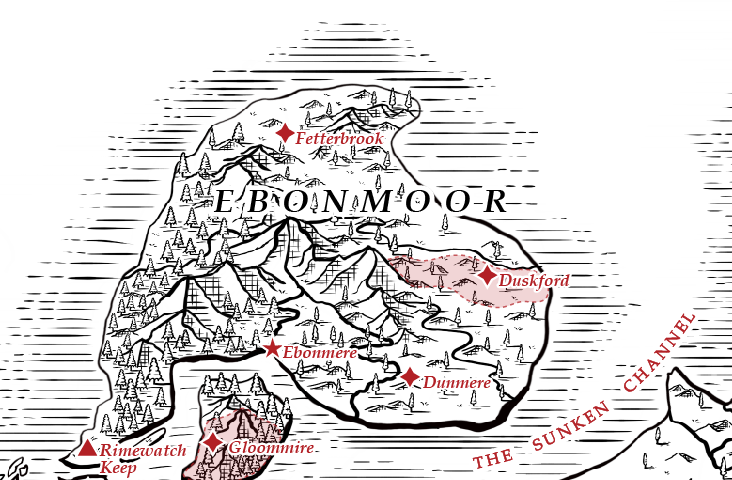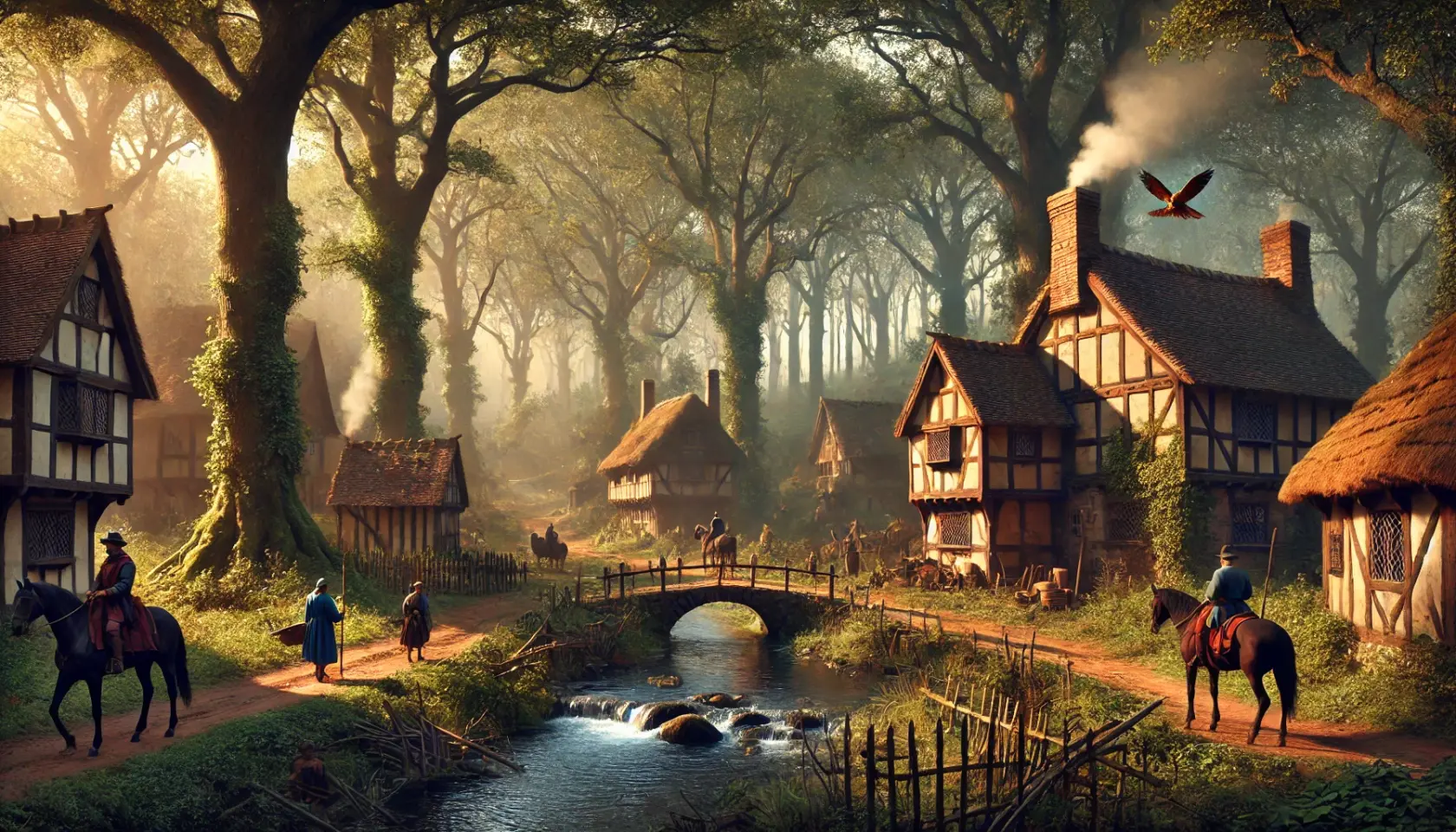Fetterbrook
The Forgotten Retreat
Fetterbrook? Yes, dreadful business, truly. Cut off, you say? Starving? A real tragedy, of course... but tell me, do you know what this means
forfor me? I used to summer there, you know. My estate overlooked the finest hunting grounds in Ebonmoor! The stag were magnificent, the air unspoiled—and now? Now I’m trapped in this miserable city, forced to endure this... this squalor while that wretched place rots away! I am the real victim in all of this! A man of my standing should not be denied his comforts simply because some peasants have misplaced their survival instincts!— Lord Alrin Vaunhast, displaced noble
Nestled within the heart of Ebonmoor’s dense forests and winding waterways, Fetterbrook was once a peaceful haven—a retreat for nobility seeking respite from the political scheming of Valkenheim and the harsh realities of Faulmoor’s marshes. The town’s many brooks and streams, which flow steadily south, once provided a gentle, idyllic setting for hunting, fishing, and leisure. Rich in wildlife and thick with towering oaks, the town flourished not as a center of trade but as a place of comfort and escape. It was never meant to sustain itself, instead relying on regular shipments from Duskford and other northern settlements.
One of the oldest settlements in Ebonmoor, Fetterbrook grew from a collection of private estates into a small but wealthy town, catering to hunters, craftsmen, and those who provided luxury goods to visiting aristocrats. Falconry, archery, and lavish feasts beneath the forest canopy were common pastimes, and its people lived well, knowing that supply lines from the north would always keep their town thriving. For generations, this was true.
Then the Rotmire Blight came, and Duskford fell.
With Duskford’s fall, Fetterbrook was severed from the north, leaving its people stranded. The waters that once carried goods and wealth southward now work against them—the brooks flow only in one direction, meaning no supplies can be sent back upstream. In an instant, the town found itself trapped, with no way to receive food, medicine, or tools. The forests, once a playground of sport, became a last desperate resource for survival.
For the first few months, they relied on their reserves, believing that help would come. But as the Blight worsened and the roads became unsafe, it became clear that no aid was coming. The nobility fled, abandoning their grand estates, while the remaining servants, hunters, and tradespeople were left to fend for themselves.
Now, Fetterbrook is fading. The people hunt, forage, and salvage what they can, but the land was never meant to support them indefinitely. Many speak in whispers of leaving, drifting south in the hopes of finding help, but few dare attempt it. The world beyond their forested home has grown dark and uncertain.
Though the people of Fetterbrook are trapped, the outside world has not forgotten them entirely—even if not in the way they had hoped.
South of Fetterbrook, where the brooks converge into larger rivers, bodies have begun washing ashore. At first, there were only a few—perhaps the unfortunate victims of a river accident, or wanderers who had succumbed to hunger. But now, more appear each week, found by travelers and villages downstream.
Some of the corpses bear the unmistakable lesions of the Rotmire Blight, bloated and twisted beyond recognition. Others, however, show no sign of infection—their faces frozen in silent terror, their bodies unmarked. The people living further south whisper that not all of them drowned—some look as though they clawed their way out of the water, only to collapse on the banks.
No one knows where they come from, or how many more will follow. Some believe they are victims of a massacre upriver, while others fear something lurks within the waters, dragging the living beneath its surface. Those downstream now refuse to drink from the brooks, believing the waters carry something worse than sickness.
Yet, in Fetterbrook, no one speaks of the dead. They have their own troubles—and besides, the water only flows south.
The town that once housed nobility and wealth has become a place of ghosts and whispers. The grand estates stand empty, their fine wooden halls now homes to squatters and the desperate. The forests that once rang with laughter and hunting horns are now quiet, save for the occasional crack of a bowstring or the distant howl of wolves.
Those who remain do not know how much longer they can last. Some hold out hope that the north will recover, that Duskford will rise again and reconnect them to the world. Others believe that Fetterbrook has already been forgotten, left to wither and die in its own isolation. And somewhere beyond their town, the rivers still run south, carrying secrets and the dead to those who will find them.
Detailed Overview
| Attribute | Details |
|---|---|
| Region | Ebonmoor |
| Ruling House | House Wilthorne |
| Population (Before Blight) | ~1,200 (A quiet noble retreat, with a mix of aristocrats, hunters, and estate workers) |
| Population (After Blight) | ~800 (Nobility fled, leaving behind servants, hunters, and those unable to escape) |
| Major Industries | Game hunting, falconry, leatherworking, woodcraft, and minor river trade |
| Primary Exports | Furs, preserved meats, fine timber, hunting falcons, and artisanal bows and arrows |
| Current Ruler | Lord Eadric Wilthorne (nominally), but the settlement is effectively leaderless |
| Government Type | Previously overseen by noble estate holders; now operates on a loose communal survival structure |
| Defenses | Naturally protected by dense forests and rivers, but no organized military presence; some former gamekeepers and hunters act as makeshift guards |
| Notable Features | The Falcon’s Rest (once a training ground for hunting birds, now nearly abandoned), The Old Manors (former noble estates, now crumbling or used as communal shelters), Hunter’s Hall (meeting place for the remaining residents, now serving as a rationing station), The River Brood (main dock used for transport, now eerily quiet), The Winding Paths (a network of game trails, now more dangerous as hunters push deeper for food) |
| Status | Cut off from the north, struggling to survive. With the fall of Duskford, all supply chains were severed, leaving Fetterbrook without vital resources. The forests provide food, but the land was never meant to sustain an independent population. The brooks flow only south, not north, making resupply impossible. Downriver settlements now report bodies washing ashore, some marked with the Blight, others unscathed but lifeless. The town’s future is bleak—those who remain either believe salvation will come, or they are too afraid to leave. |
Notable Establishments
The Falcon’s Rest
Once a renowned training ground for hunting birds, the Falcon’s Rest was where nobles bred and trained falcons for sport and prestige. The high stone perches and wooden aviaries still stand, though most of the birds have either starved or flown away. Only a handful remain, kept by a few dedicated falconers who refuse to abandon them. Some believe that if they can keep the falcons alive, they may yet find a way to trade them for supplies—if anyone is left to buy.
The Old Manors
Scattered across the forest, the noble estates of Fetterbrook were once grand homes of leisure, filled with roaring hearths, fine tapestries, and well-stocked cellars. Now, many of them are abandoned, their windows dark and their gardens overgrown. Some have been repurposed into makeshift communal shelters, where those left behind try to survive. Others remain locked and sealed, their former owners having fled in haste, leaving behind only empty halls and forgotten luxuries that no one can afford to care for anymore.
Hunter’s Hall
This wooden longhouse was once the center of Fetterbrook’s hunting community, where skilled bowyers and trackers shared their kills and traded furs. Now, it serves as a rationing station and gathering place for the survivors. Every day, hunters return here with whatever they can find—deer, rabbits, even squirrels—and the meat is divided among those who remain. Disputes over food are becoming more common, and there are whispers that some hunters are keeping more for themselves than they admit.
The River Brood
The small dock that once sent boats downriver now sits eerily quiet. It was used to transport goods south, ensuring that Fetterbrook could trade with distant villages. Now, it holds only empty moorings and forgotten fishing nets, the water lapping softly against the wood. No one sails from Fetterbrook anymore—not when the river brings only the dead. Those who live near the water refuse to speak of it, but they all know what’s being found further downstream.


